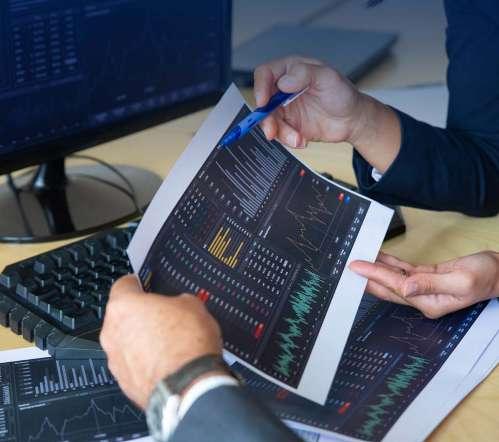
2 minute read
Inter-Dealer Broking
An inter-dealer broker is a specialist financial intermediary that facilitates transactions between broker-dealers, dealer banks and other financial institutions.
OVERVIEW
Buying stocks and other securities can be a confusing process. So individual investors usually engage a broker to advise them on the process and help them find the best investment opportunities.
Inter-dealer brokers (IDBs), however, specifically focus on facilitating trades of securities or other investment products between corporate entities. If large corporations, financial institutions, or even government bodies want to trade financial assets amongst themselves, they will usually engage the services of an IDB.
Inter-dealer brokers serve as neutral intermediaries for such clients, who may wish to trade under anonymous conditions in cases where direct contact between the parties may result in less-favorable prices being quoted (e.g. if two competing banks are trading with each other). Some corporate clients may also trade through IDBs because they don’t want to accidentally trigger market speculation, or if the trade in question is very large and complex.
Most inter-dealer brokers typically specialise in a particular product, and communicating with clients – whether electronically or over the phone – is at the heart of their work. Simpler trades can be done directly through dedicated terminals and online platforms provided by the IDB, but more complex ones need to be done over calls between the client and the IDB.
Inter-dealer brokering can also significantly expand a financial organisation’s capabilities by allowing it to access new potential investors and suppliers. Thus, banks and stock brokerage firms also use inter-broker trading platforms to seek out new business opportunities.
CAREER PATHWAYS
Most candidates begin as junior brokers in a team, and are typically mentored by a senior member before becoming full-fledged brokers.
Managerial positions begin at the level of desk manager, and progress to director or division head. At this level, you will spend less time doing actual brokerage work, and more time instead making sure your “desk” or business area is running correctly and meeting its targets.
Incomes from inter-dealer broking are unlikely to be affected by market volatility because they are based on a percentage of the deal between two parties, regardless of whether prices rise or fall. In fact, inter-dealer brokers may earn even more during volatile market periods because clients tend to trade in larger volumes then.
Keeping up with instant market changes and facilitating trades in off-exchange (i.e. hidden) assets between major market players is an exciting aspect of the job. Working hours are long, as they depend on the opening and closing hours of the market index an inter-dealer broker oversees; but that also makes the hours relatively stable as a result.
However, one of the toughest aspects about working in the area is the fast-paced and high-pressure environment. Moreover, it’s an interdealer broker’s responsibility to guide difficult clients who insist on making unfeasible transactions towards a recommended deal as diplomatically as possible.
REQUIRED SKILLS
While a degree in a financial discipline would be an advantage, it is not essential. a strong interest in working in the financial sector is more important.
A keen interest in financial markets is required, as well as good communication skills and a sociable disposition. Interpersonal skills and confidence are also required to establish rapport with clients, especially over the phone.
Patience, as well as the energy and endurance required to succeed in a fast-paced environment, is another important trait. As a result, the best inter-dealer brokers are composed, decisive, adaptable, and capable of performing well under pressure.










